PATHO 370 (PATHO 370)
West Coast University
Page 4 out of 193 results
Sort by

-
PATHO 370 FINAL EXAM GUIDE 2023 COMPLETE
- Exam (elaborations) • 13 pages • 2023
- Available in package deal
-
- $13.49
- + learn more
PATHO 370 FINAL EXAM GUIDE 2023 COMPLETE. Manifestations from sodium imbalances occur primarily as a result of cellular fluid shifts. 8.The consequence of an upper urinary tract obstruction in a single ureter is hydronephrosis. 9.Accumulation of fluid in the pleural space is called pleural effusion. 10.A patient presenting with a severe, pounding headache accompanied by nausea and photophobia is likely experiencing a ________ headache. migraine 11.Which dysrhythmia is thought to be associat...
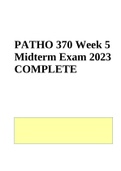
-
PATHO 370 Week 5 Midterm Exam 2023 COMPLETE
- Exam (elaborations) • 12 pages • 2023
-
Available in package deal
-
- $12.49
- + learn more
PATHO 370 Week 5 Midterm Exam 2023 COMPLETE. Pathophysiology. What age group has a larger volume of extracellular fluid than intracellular fluid? Infants 20.How is a patient hospitalized with a malignant tumor that secretes parathyroid hormone–related peptide monitored for the resulting electrolyte imbalance? Serum calcium, bowel function, level of consciousness 21.A deficiency of von Willebrand factor impairs platelet adhesion to injured tissue 22.Pneumocystitis is a term that refers ...

-
PATHO 370 MIDTERM EXAM LATEST COMPLETE GUIDE 2023
- Exam (elaborations) • 58 pages • 2023
-
Available in package deal
-
- $16.99
- + learn more
PATHO 370 MIDTERM EXAM LATEST COMPLETE GUIDE 2023. What factor causes a congenital heart disease to produce cyanosis? Selected Answer: Left-to-right shunting of blood Correct Answer: Right-to-left shunting of blood Response Feedback: Disorders that result in right-to-left shunting cause cyanosis. A left-to-right shunt occurs when oxygenated blood from the left side of the heart or aorta flows back into the right side to be recirculated through the lungs. The blood reaching the syste...
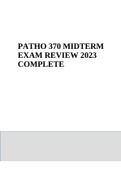
-
PATHO 370 MIDTERM EXAM REVIEW 2023 COMPLETE
- Exam (elaborations) • 124 pages • 2023
-
Available in package deal
-
- $16.49
- + learn more
PATHO 370 MIDTERM EXAM REVIEW 2023 COMPLETE. Pathophysiology. Acute versus Chronic Stress: • Acute stress: associated with the ANS, the fight or flight response; persons with preexisting heart disease can have complications with acute stress response that can lead to arrhythmias; in healthy individuals acute stress response can redirect attention from behaviors that promote health and interrupt compliance with medication regiments & exercise programs • Chronic stress: it has been linke...
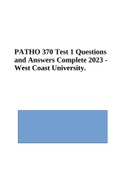
-
PATHO 370 Test 1 Questions and Answers Complete 2023 - West Coast University.
- Exam (elaborations) • 32 pages • 2023
-
Available in package deal
-
- $13.99
- + learn more
PATHO 370 Test 1 Questions and Answers Complete 2023 - West Coast University. Necrotic death of brain tissue usually produces _____ necrosis. Selected Answer: d. liquefactive Correct Answer: d. liquefactive Response Feedback: Liquefactive necrosis is produced when brain tissue dies, as it is rich in enzymes and has little connective tissue. Coagulative necrosis occurs from ischemic injury in any tissue. Caseous necrosis occurs in lung tissue damaged by tuberculosis. Fat necrosis occurs i...
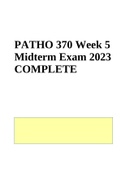
-
PATHO 370 Week 5 Midterm Exam 2023 COMPLETE
- Exam (elaborations) • 12 pages • 2023
- Available in package deal
-
- $12.49
- + learn more
PATHO 370 Week 5 Midterm Exam 2023 COMPLETE. .Blood flow throughout the periphery is regulated by the autonomic nervous system. 2.Pulse pressure is defined as systolic pressure – diastolic pressure 3.The patient who requires the most careful monitoring for development of metabolic acidosis is a patient who has had diarrhea for over a week. 4.Uncompensated metabolic alkalosis would result in increased pH, increased HCO 3 – . 5.A common characteristic of viral pneumonia is increased c...
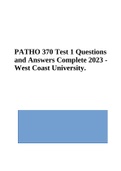
-
PATHO 370 Test 1 Questions and Answers Complete 2023 - West Coast University
- Exam (elaborations) • 32 pages • 2023
- Available in package deal
-
- $15.49
- + learn more
PATHO 370 Test 1 Questions and Answers Complete 2023 - West Coast University. All the following stress-induced hormones increase blood glucose except Selected Answer: c. aldosterone. Correct Answer: c. aldosterone. Response Feedback: Aldosterone results in water and sodium retention and potassium loss in the urine. It does not affect blood glucose. Cortisol is a glucocorticoid secreted by the adrenal cortex. Cortisol stimulates gluconeogenesis in the liver, thus increasing blood glucose....
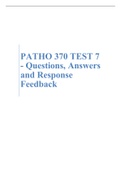
-
PATHO 370 TEST 7 - Questions, Answers and Response Feedback
- Exam (elaborations) • 18 pages • 2023
-
Available in package deal
-
- $14.49
- + learn more
Question 1 0.125 out of 0.125 points Risk factors for hemorrhagic stroke include Selected Answer: d. acute hypertension. Correct Answer: d. acute hypertension. Response Feedback: Intracerebral hemorrhage is a hemorrhage within the brain parenchyma and usually occurs in the context of severe and often longstanding hypertension. Risk factors for stroke are similar to those for other atherosclerotic vascular disease. Cardiac disease complicated by atrial fibrillation is an important risk factor for...
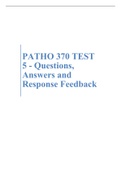
-
PATHO 370 TEST 5 - Questions, Answers and Response Feedback
- Exam (elaborations) • 17 pages • 2023
-
Available in package deal
-
- $13.99
- + learn more
Question 1 0.125 out of 0.125 points At his most recent clinic visit, a patient with end-stage renal disease is noted to have edema, congestive signs in the pulmonary system, and a pericardial friction rub. Appropriate therapy at this time would include Selected Answer: b. initiation of dialysis. Correct Answer: b. initiation of dialysis. Response Feedback: Dialysis is the appropriate therapy at end-stage renal disease. Although fluid restriction may be appropriate at some point in renal failure...
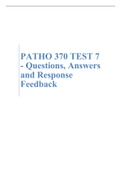
-
PATHO 370 TEST 7 - Questions, Answers and Response Feedback
- Exam (elaborations) • 18 pages • 2023
-
Available in package deal
-
- $14.49
- + learn more
Question 1 0.125 out of 0.125 points Risk factors for hemorrhagic stroke include Selected Answer: d. acute hypertension. Correct Answer: d. acute hypertension. Response Feedback: Intracerebral hemorrhage is a hemorrhage within the brain parenchyma and usually occurs in the context of severe and often longstanding hypertension. Risk factors for stroke are similar to those for other atherosclerotic vascular disease. Cardiac disease complicated by atrial fibrillation is an important risk factor for...

How much did you already spend on Stuvia? Imagine there are plenty more of you out there paying for study notes, but this time YOU are the seller. Ka-ching! Discover all about earning on Stuvia


